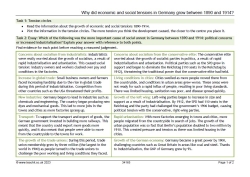Why did economic and social tensions in Germany grow between 1890 and 1914?

In this resource, students read information about factors that caused tensions in German society in the run-up to the First World War and complete a circles diagram in which they categorise each factor as high tension, medium tension or low tension.
They then use the information to provide evidence for an exam-style essay question.
The resource is designed to support the GCSE AQA period study 'Germany, 1890–1945: Democracy and dictatorship'.
Two of the factors from this resource:
Concerns about socialism from the conservative elite:
The conservative elite worried about the growth of socialist parties in politics, a result of rapid industrialisation and urbanisation. Political parties such as the SPD grew in support and began to dominate the Reichstag (110 seats in the Reichstag by 1912), threatening the traditional power that the conservative elite had held.
Growth of the German economy:
Germany became a great power by 1900, challenging countries such as Great Britain in areas like coal and steel. Thanks to industrialisation, the GNP of Germany grew by 9%.
